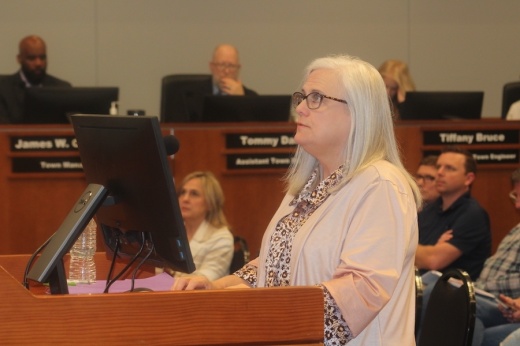Council Member Chris Drew voted against the budget and tax rate, but both proposals passed with 4-1 votes with Council Members Jim Engel, Adam Schiestel, Ann Martin and Brian Taylor voting for the measures. Drew along with other council members discussed their views about the budget and tax rate after town Chief Financial Officer Tammy Wilson gave a presentation. The budget included a second motion to ratify the property tax revenue increase reflected in the FY 2023-24 budget, which Drew approved. The approved tax rate is $0.3873 per $100 valuation, the lowest-ever rate in town history, officials said.
The background
Breaking down the new $0.3873 tax rate, the maintenance and operations portion of the tax rate is $0.348344, and the interest and sinking part is $0.038956. Last year’s tax rate was $0.405. The average tax bill this year with the homestead exemption will be $1,649, based on the average home value of $486,470. The tax rate adoption must be stated as an increase for any rate adopted above the no-new-revenue rate, even if the actual rate remains the same as the previous year, Wilson said The no-new-revenue tax rate is $0.359022.
The higher tax rate is based on a comparison of the approved tax and the no-new-revenue rate.
“However, in FY 2022-23, residents did not pay the no-new-revenue tax rate,” Wilson said in an email. “They paid the rate adopted by Council, which at the time which was $0.4050 per $100 valuation. By lowering the total tax rate from $0.4050 in FY 22-23 to $0.3873 in FY 23-24, the Town has lowered the tax rate to the lowest in the Town’s history.”
The proposed budget for the general fund includes $92.64 million in revenues and $88.14 million in expenditures, according to the council agenda memo. This budget includes the baseline budget, nondiscretionary requests and decision packages. Agencies that provide community support for the town and meet certain criteria are eligible to request community support funding. The proposed budget includes $225,800 for community support funding.
One of the highlights of the budget is council approved raising the homestead exemption to 12.5% from 10% and increasing the homestead exemption for over-65 and disabled individuals from $100,000 to $150,000.
What they’re saying
Drew said he was “still concerned” about the overall budget because the council is increasing the tax rate the most it can by law without sending it to the voters.
“I’d like to get closer to the no-new-net revenue tax rate, and I think we can do that by reducing the general fund fund balance or even reducing some of the items from the decision packages,” he said.
The general fund budget shows $5.2 million in decision packages. That money can be used for a range of expenses. Decision packages, though, can only be used for the specific items/projects that they were originally submitted for, Wilson said.
Schiestel said there was $4.5 million that could be allocated for tax relief if the council wanted to do that, and it would not cost the town anything. He said he thought it would be prudent and reasonable to do so.
“There’s really no downside to reducing the tax rate—we just don’t want to do it,” he said.
He said he thinks the revenue could be reduced to $92 million and still be “well funded for the future.”
Council Member Ann Martin said she disagreed with Schiestel’s assertion that the council just refused to reduce the tax rate; his statement was misleading, and there are “sound, financial reasons” for supporting the proposed tax rate, she said. She said inroads have been made in reducing the tax bill, but she praised the financial planning the town has sought in ensuring they are saving money for unanticipated and expected expenses. She said the town is lowering the tax bill and maintaining quality-of-life measures for the town.
Council Member Brian Taylor said one of council’s goals was property tax relief, and council did that with the homestead, over-65 and disabled exemptions. He said he was worried how decisions made now could affect future Town Council members years down the road; he did not want them to have to raise taxes so much that it would have to go to the voters. He said he thought council should keep the tax rate at the proposed level—the lowest in the town’s history—and the town staff and council could address the fund balance rate next year and see whether any tax savings could be found on the rate.





